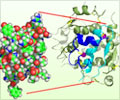Patients with diabetes whose multi-vessel coronary artery disease is treated with bypass surgery live longer and are less likely to suffer severe complications than those who undergo angioplasty.

"We've shown that bypass surgery saves one extra life for every 20 patients with diabetes who are treated for multi-vessel coronary artery disease," says lead author, Dr. Michael Farkouh, Chair of the Peter Munk Centre of Excellence in Multinational Clinical Trials, Peter Munk Cardiac Centre, UHN.
Five years after treatment, patients who received coronary artery bypass grafts (CABG) had lower combined rates of strokes, heart attacks, and deaths (18.7 percent) than those who underwent angioplasty (26.6 percent). Strokes were slightly more common among the CABG group (5.2 percent) than in the angioplasty group (2.4 percent), however, more angioplasty patients died from any cause (16.3 percent) than CABG patients (10.9 percent).
"Based on these results, we believe that coronary artery bypass surgery should be standard therapy for the millions of patients worldwide with diabetes who have more than one diseased vessel," says Dr. Farkouh, who is the Chair of Cardiology Research and an associate professor of medicine at the University of Toronto.
Coronary artery disease is the buildup of plaque in the coronary arteries. It's the most common form of heart disease and can lead to chest pain, heart failure and heart attack. According to the Public Health Agency of Canada, almost 2.4 million Canadians live with diabetes.1
A total of 1,900 patients were enrolled at 140 international centers from 2005-2010. All participants had diabetes and more than one diseased artery, and 83% had three-vessel disease. Half the participants received bypass surgery and the other group received angioplasty – which includes percutaneous coronary intervention and drug-eluting stents. The study followed patients for a median of four years and a minimum of two. Patients in both streams of the study were prescribed optimal medical management for control of high LDL cholesterol, high blood sugar levels and high blood pressure. The result assessed all-cause mortality, non-fatal heart attacks, and non-fatal stroke.
Advertisement
The study focused on diabetes because patients with diabetes have cardiac events more often than patients who do not have diabetes, and require more follow-up care than other patients. Cardiovascular disease is a major complication of diabetes and the leading cause of early death among people with this disease — about 65 percent of people with diabetes die from heart disease and stroke. Adults with diabetes are two to four times more likely to have heart disease or suffer a stroke than people without diabetes.
Advertisement
Source-Eurekalert















